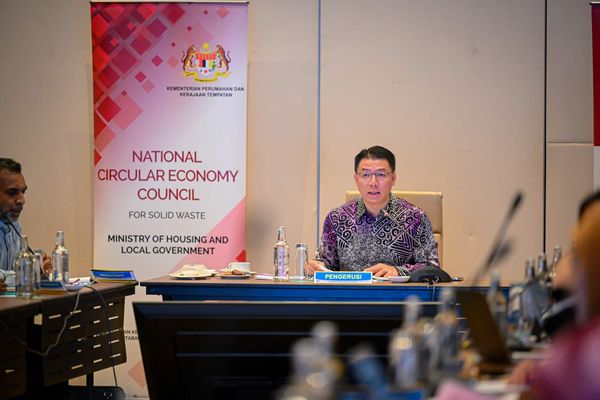PUTRAJAYA, May 9 — The National Circular Economy Council (NCEC) meeting has approved, in principle, the proposed Extended Producer Responsibility (EPR) Policy Framework and agreed to the mandatory implementation of eco-design.
Housing and Local Government (KPKT) Minister Nga Kor Ming said the EPR was among the key focus areas of the ministry this year, emphasising the concept of government-private joint responsibility in managing solid waste.
“EPR is a crucial instrument in the circular economy, establishing joint responsibility between the government and industry to manage waste sustainably and responsibly, thus reducing the financial burden on the government in handling solid waste,” he said in a statement after chairing the meeting today.
The EPR Policy Framework, developed by KPKT, resulted from an engagement session with various stakeholders, particularly industry players.
Nga said the framework included key elements like the EPR model, the determination of obligated companies, procurement targets, types of materials, implementation phases, and the roles and responsibilities of relevant stakeholders.
The NCEC also approved four new policies to drive the circular economy, including a proposal for the mandatory implementation of eco-design submitted by the Natural Resources and Environmental Sustainability Ministry (NRES).
He said this proposal included the development of mandatory policies, regulations, frameworks, guidelines, and eco-design standards.
“These eco-designed products will foster a culture of sustainable product use and boost consumer confidence,” Nga said.
He added that the NCEC had agreed that, effective January 1, 2026, all shopping complexes must provide recycling facilities or drive-through recycling centres as a condition for local authority premises licences.
The council also took note of the 'KITAR: Peranti Lama, Nafas Baharu' initiative, implemented by the Communications and Multimedia Commission (MCMC), which emphasised the importance of managing e-waste efficiently and effectively through recycling and remanufacturing processes.
In addition, PR1MA Corporation Malaysia has launched the Recycling Programme at Komuniti PR1MA residences, in collaboration with the Solid Waste Management and Public Cleaning Corporation (SWCorp).
Nga said the programme involved the purchase of used cooking oil, recycled goods, and activities to raise public awareness of recycling.
“This initiative serves as an example that supports the blueprint for housing developers to provide facilities that support the circular economy and collaborate with the government in the transformation towards a low-carbon society,” he said.
All outcomes of the NCEC meeting were in line with the 12th Malaysia Plan (12MP) and the Circular Economy Blueprint for Solid Waste 2025–2035, which aimed to realise the national agenda for transforming solid waste management per the circular economy model.
“The KPKT will present the outcomes of this meeting for the Cabinet’s consideration and approval,” he said.
Nga also announced that Malaysia Cleanup Day would be celebrated on September 27 in Port Dickson, Negeri Sembilan, with 100,000 participants representing various sectors, including ministries, government departments, industries, non-governmental organisations, educational institutions, security personnel, and the public.
The programme is an annual event to raise awareness among Malaysians about the importance of maintaining environmental cleanliness.
— Bernama


